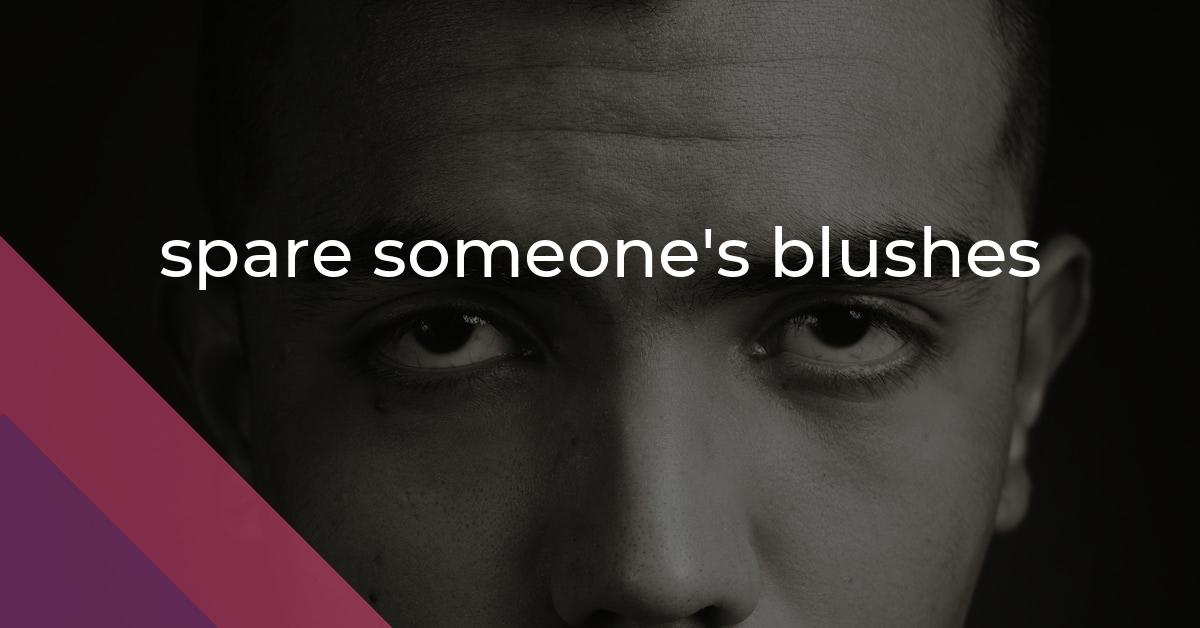spare someone’s blushes: Idiom Meaning and Origin
What does ‘spare someone's blushes’ mean?
The idiom "spare someone's blushes" means to prevent someone from feeling embarrassed or ashamed in a particular situation.

Idiom Explorer
The idiom "turn a number of shades of red" means to become extremely embarrassed or ashamed, causing one's face to flush with redness.
The idiom "tan someone's hide" means to punish or discipline someone physically, often by giving them a beating. This phrase is usually used to indicate a severe or harsh form of punishment.
The idiom "spare someone the details" means to refrain from providing someone with all the specific information or unnecessary details about something.
The idiom "shut one's face" means to stop talking or to be quiet. It is a rude and direct way of telling someone to be silent or stop speaking. This phrase is considered impolite and should be used cautiously, as it may offend or upset others.
The idiom "send someone to the showers" means to remove someone from a situation or activity, typically in a dismissive or humiliating manner.
The idiom "save someone's skin" means to rescue or protect someone from danger or harm.
The idiom "save someone's face" means to protect someone's reputation or dignity by preventing them from feeling embarrassment or humiliation.
The idiom "save one's breath" means to not waste one's time and effort in trying to convince or persuade someone who is unlikely to change their opinion or beliefs.
The idiom "raise someone's hackles" means to make someone very angry or annoyed.
FAIL
The idiom "spare someone's blushes" refers to preventing someone from feeling embarrassed or ashamed in a particular situation. It is often used in the United Kingdom and is less common in American English. The origin of this phrase is not clear-cut, but it dates back to the 17th century. Blushing has long been associated with embarrassment or shame, and the idiom uses the word "blushes" metaphorically to represent those feelings. By sparing someone's blushes, you are protecting them from potentially embarrassing or compromising situations.
The idiom "spare someone's blushes" can be used in various contexts and is commonly used in everyday language. It describes actions taken to prevent someone from being embarrassed or to avoid causing them discomfort. One might spare someone's blushes by refraining from revealing embarrassing information or by deflecting attention away from a potentially awkward topic. It is a kind and considerate action that aims to shield individuals from undue embarrassment in social or professional situations.
Another related idiom is "save someone's face." This expression means to protect someone's reputation or dignity, especially in a difficult or embarrassing situation. It is similar to "spare someone's blushes" in that it involves preventing someone from feeling embarrassed or ashamed. However, "save someone's face" emphasizes the importance of preserving one's reputation or standing in the eyes of others.
Similarly, the idiom "save someone's skin" is also related to "spare someone's blushes." This phrase means to rescue or protect someone from harm, danger, or an embarrassing situation. While "spare someone's blushes" focuses on preventing embarrassment or shame, "save someone's skin" extends to physical or personal protection. It implies taking actions to keep someone safe or out of trouble.
The idiom "spare someone's blushes" showcases the capacity of language to capture complex emotions and experiences through vivid imagery. It highlights the universal human desire to preserve dignity and protect others from unnecessary shame or discomfort. This expression, along with related idioms like "save someone's face" and "save someone's skin," reflects the importance of empathy and consideration in our interactions with others.
The idiom "spare someone's blushes" has its origins in 17th-century language and is frequently used in the United Kingdom. It denotes the act of preventing someone from feeling embarrassed or ashamed and implies a considerate and protective action. Through its metaphorical use of blushing, the idiom captures the essence of safeguarding individuals' dignity and shielding them from uncomfortable situations. While the precise etymology of this expression may remain elusive, it continues to be a relevant and relatable idiom in contemporary English.
Example usage
Examples of how the idiom "spare someone's blushes" can be used in a sentence:
- She didn't mention his embarrassing mistake in front of everyone, sparing his blushes.
- The teacher quickly changed the subject to spare the student's blushes after they gave a wrong answer.
- He winked at his friend, knowing she was about to say something embarrassing, and decided to spare her blushes by changing the topic.
More "Embarrassment" idioms



